The Seven Healthiest Seeds for Your Diet
Besides making great additions to salads, soups, trail mixes, and snacks, seeds pack a big nutritional punch considering their size. While not as popular as nuts, seeds offer just as much nutritional value and deserve a spot on your plate. Seeds provide:
- Iron – for energy balance, blood health, and infection prevention
- Calcium – for bone health
- Magnesium – for brain and bowel health and control of blood sugar levels
- Phosphorus – for cell repair and waste filtration
There are an overwhelming number of seeds to choose from, so we rounded up seven kinds of seeds that offer the best nutritional value.
Healthiest seeds to add to your diet
1. Flaxseed
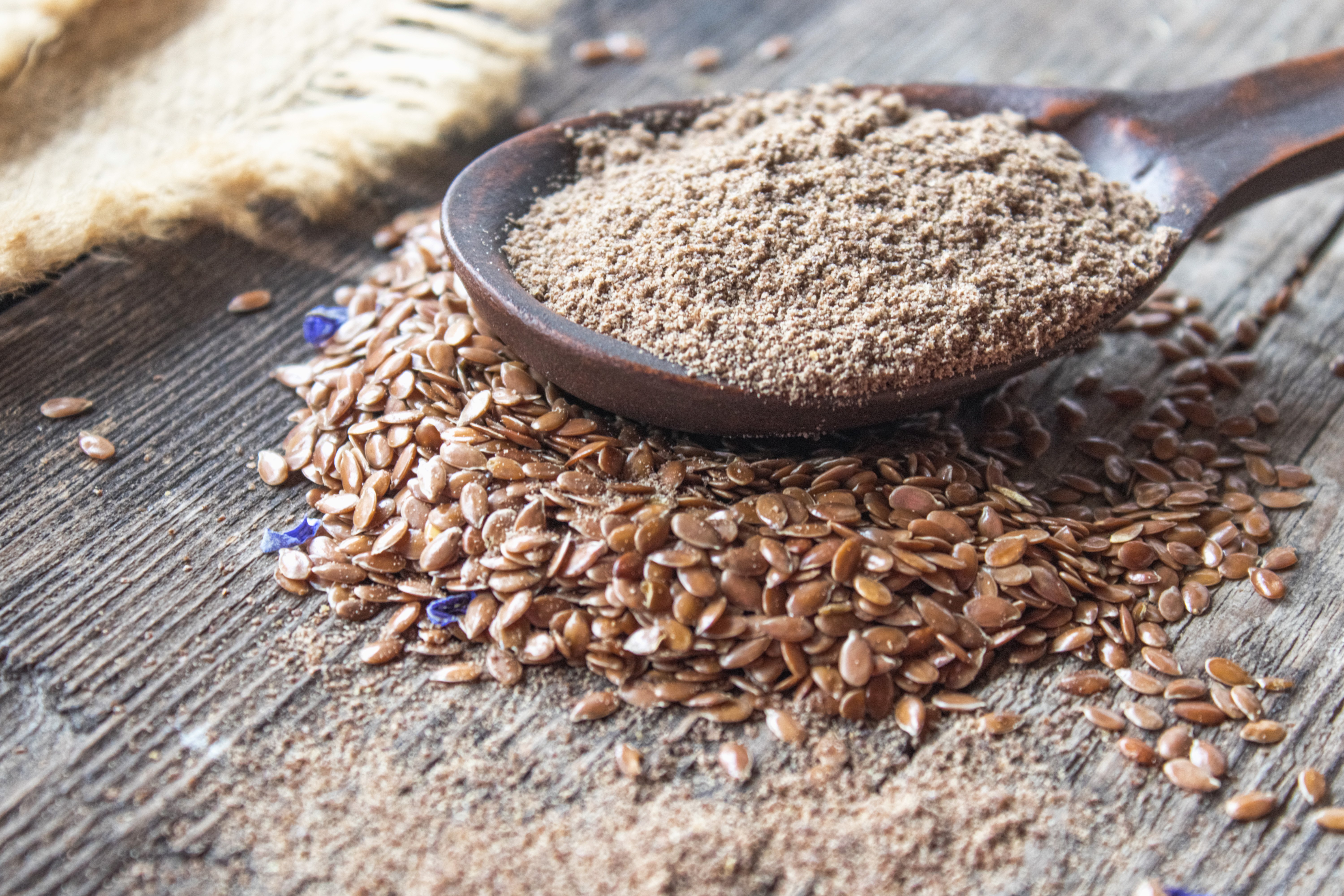
Flaxseed, sometimes referred to as linseed or just flax, is a healthy source of fiber and omega-3 fatty acids. Most importantly, flaxseed contains alpha-linolenic acid (ALA). ALA helps convert blood sugar into energy using oxygen. ALA is also considered an antioxidant and can neutralize free radicals that damage cells at the genetic level. It’s unique from other antioxidants in that it’s both water- and fat-soluble, meaning it can deliver energy immediately or be stored for future use.
Unfortunately, the omega-3s in flaxseed are only found in their hard shell, which isn’t digestible. Grinding up whole flaxseed allows for easier digestion, and in turn absorption of the omega-3s.
Flaxseed nutrition
One serving of ground flaxseed is around one tablespoon (7 grams) and contains:
- Calories: 37
- Total carbohydrates: 2 grams
- Protein: 1.3 grams
- Total fats: 2.9 grams (4.8% recommended dietary intake [RDI])
- Fiber: 1.9 grams (6.7% RDI)
- Calcium: 18 milligrams (1.8% RDI)
- Magnesium: 27 milligrams (7.4% RDI)
2. Chia seeds
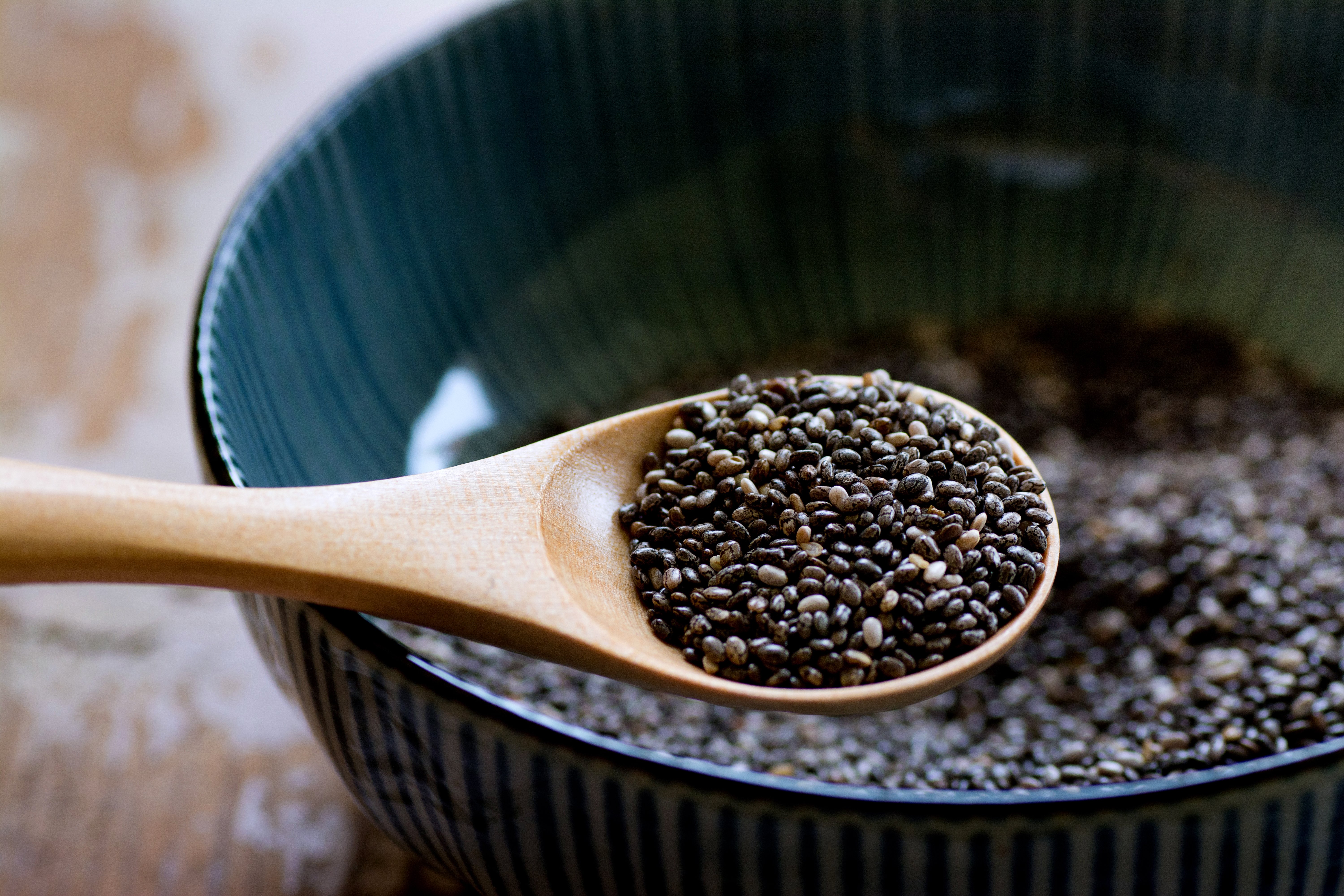
Remember Chia Pets? Those fuzzy busts were actually covered in chia seeds! Due to their high nutritional content, this superfood has skyrocketed in popularity within the health and wellness world. While one ounce of these tiny seeds has around 12 grams of carbohydrates, 10 grams of those carbs are actually fiber, which won’t spike your blood sugar levels – but instead help balance them!
Chia seeds are also a great way to bulk up smoothies as their high soluble-fiber content allows them to absorb up to 10–12 times their weight in water. The fiber content in chia seeds also leaves you feeling fuller longer.
Chia seed nutrition
One serving of dried chia seeds is around two tablespoons (28.35 grams) and contains:
- Calories: 138
- Total carbohydrates: 11.9 grams
- Protein: 4.68 grams
- Total fats: 8.7 grams
- Fiber: 9.75 grams (34% RDI)
- Calcium: 179 milligrams (17.9% RDI)
- Potassium: 115 milligrams (2.4% RDI)
3. Hemp seeds
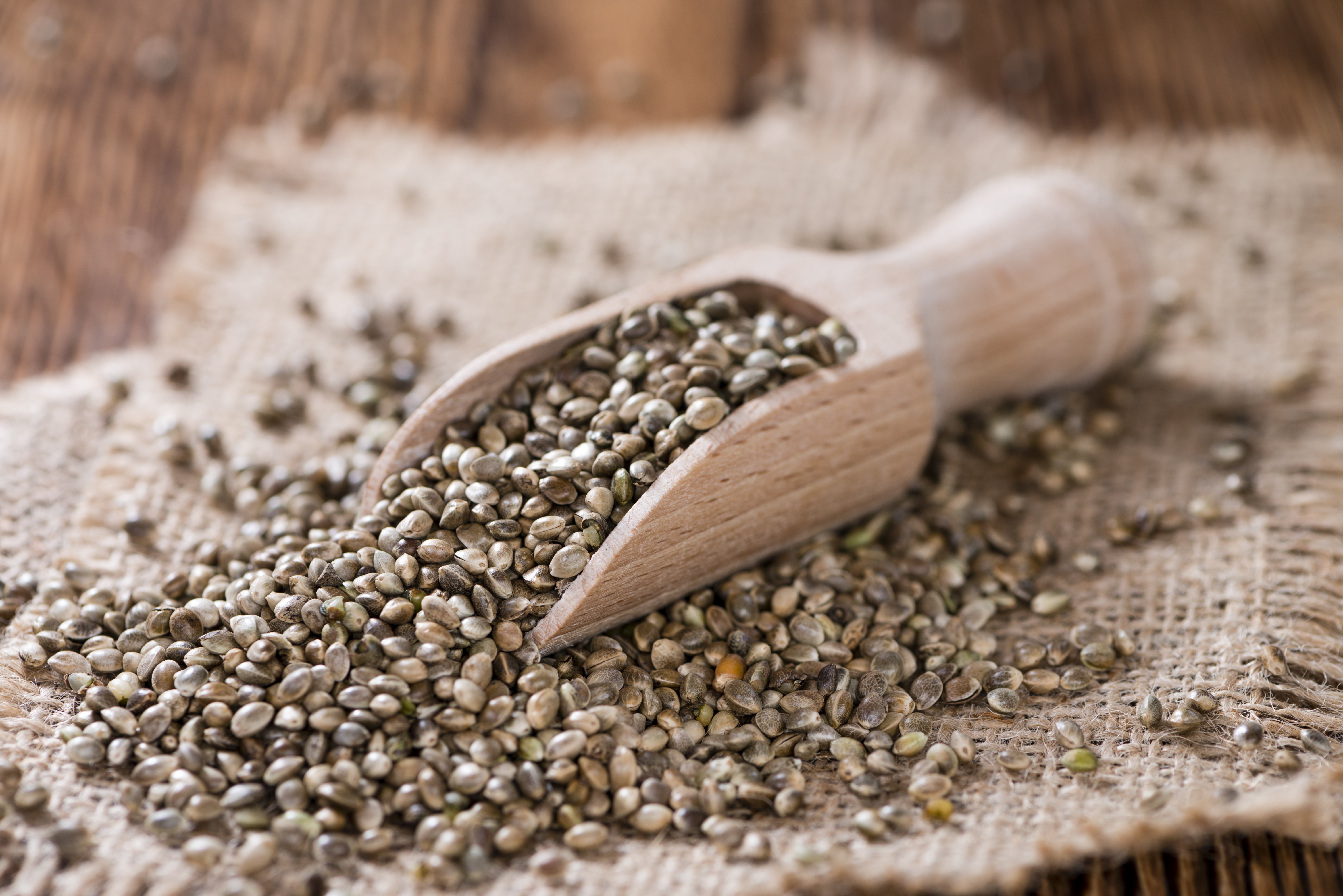
Hemp seeds may come from the same plant species as marijuana, but don’t worry – the microscopic amounts of tetrahydrocannabinol (THC) found in hemp seeds make them perfectly safe to incorporate in your diet. Hemp seeds contain all the essential amino acids (the ones your body can’t make on its own), which is rare in plant-based protein sources. They’re also full of fiber and packed with other nutrients, such as omega-3 and omega-6 fatty acids, vitamin E, B vitamins, and folic acid.
Hemp seed nutrition
One serving of hulled hemp seeds is three tablespoons (30 grams) and contains:
- Calories: 166
- Total carbohydrates: 2.6 grams
- Protein: 9.48 grams
- Total fats: 14.6 grams
- Fiber: 1.2 grams (4.2% RDI)
- Phosphorus: 495 milligrams (71% RDI)
- Potassium: 350 milligrams (7.5% RDI)
4. Sesame seeds
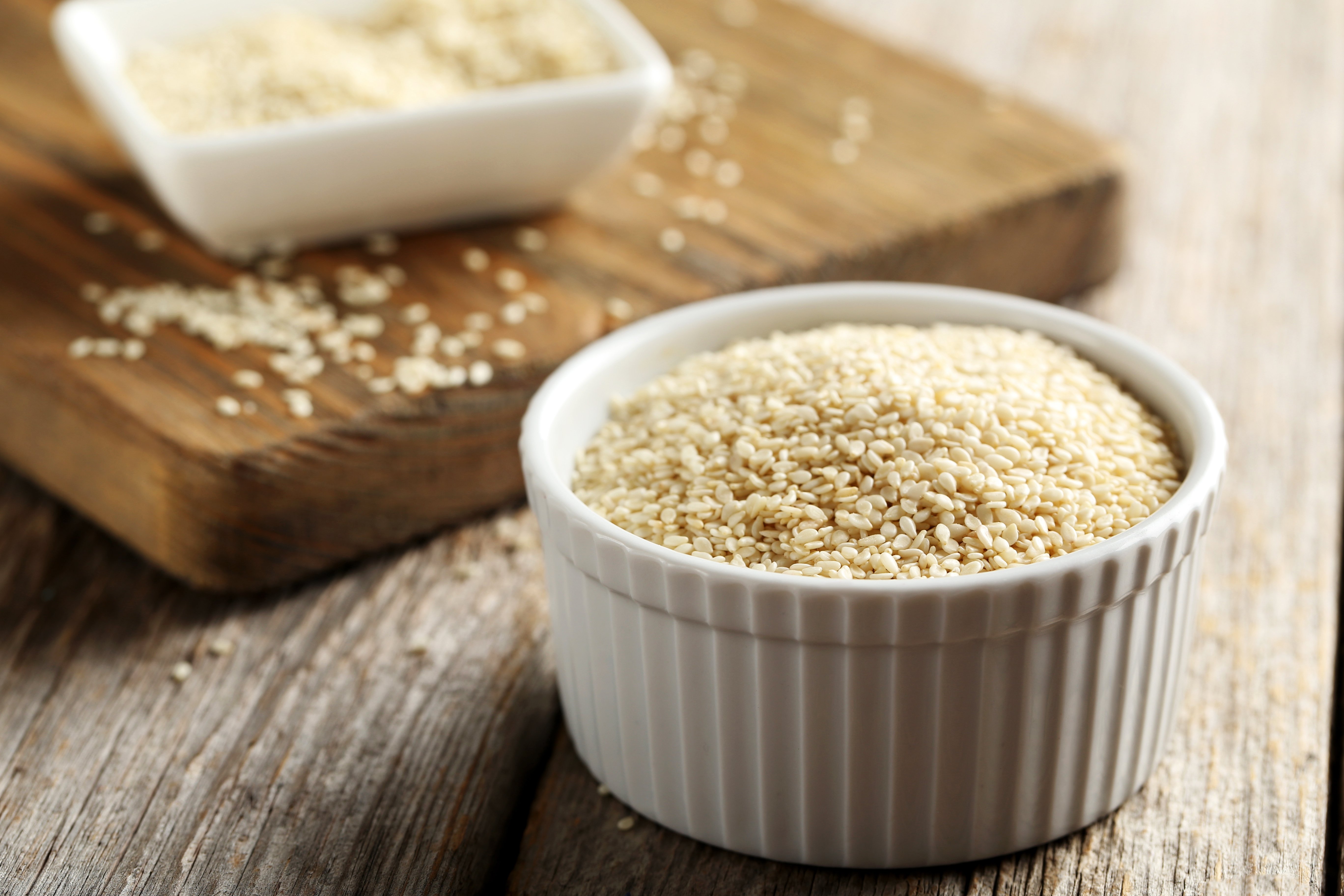
As another superfood (and an affordable one at that!), sesame seeds are more commonly associated with Asian dishes, but they can be used to season all kinds of meals. You may have also seen or eaten sesame seeds in their ground form – tahini!
Sesame seeds are a great source of fiber, selenium, iron, and magnesium. Selenium protects cells from damage, reduces the risk of some kinds of fertility issues, and can help prevent some kinds of cancer. Iron is crucial for blood health and muscle tone, while magnesium greatly improves circulation and digestion.
These tiny seeds are also shown to be a great source of plant-based protein, providing around five grams of protein per three-tablespoon serving.
Sesame seed nutrition
One serving of sesame seeds is one tablespoon (9 grams) and contains:
- Calories: 51.6
- Total carbohydrates: 2 grams
- Protein: 1.6 grams
- Total fats: 4.5 grams
- Fiber: 1 grams (3.6% RDI)
- Calcium: 88 milligrams (8.8% RDI)
- Phosphorus: 56.6 milligrams (8% RDI)
5. Pumpkin seeds
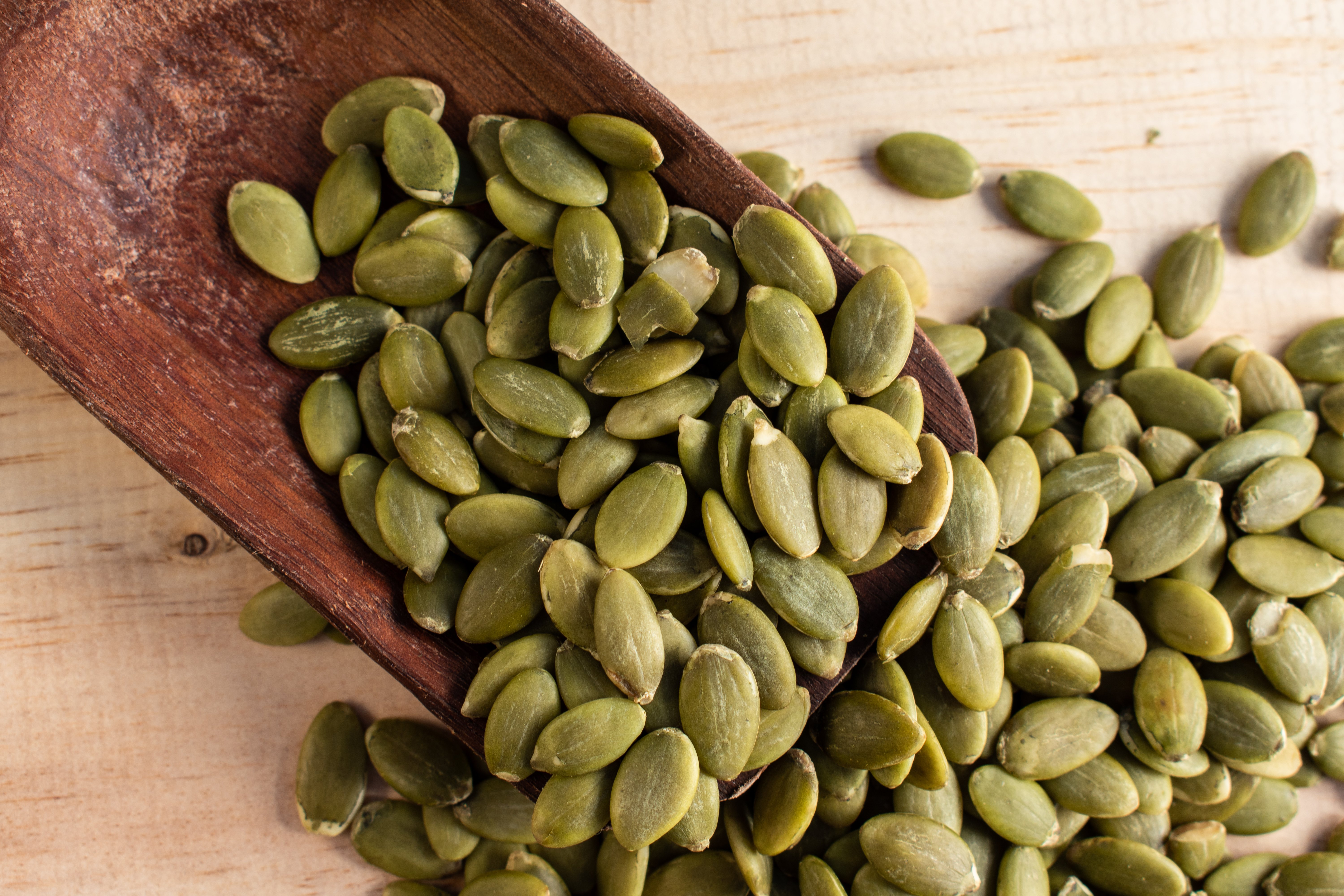
Not just fit for fall, pumpkin seeds are a great snack all year round! Sometimes called pepitas (roughly meaning “little seeds of squash”), pumpkin seeds are typically roasted and enjoyed on salads, in soups, or just by the handful. They are a good source of magnesium, which is linked to bone health and type 2 diabetes prevention.
Pumpkin seeds may even help you sleep better. They contain high levels of the amino acid tryptophan, which your body converts into melatonin and serotonin. One study suggests that eating a handful of pumpkin seeds along with a complex carbohydrate has the same effect as taking pharmaceutical-grade tryptophan.
Pumpkin seed nutrition
One serving of pumpkin seeds is a quarter cup (32 grams) and contains:
- Calories: 180
- Total carbohydrates: 3 grams
- Protein: 10 grams
- Total fats: 16 grams
- Fiber: 2 grams (7.1% RDI)
- Phosphorus: 345 milligrams (49% RDI)
- Magnesium: 162.2 milligrams (44% RDI)
6. Sunflower seeds
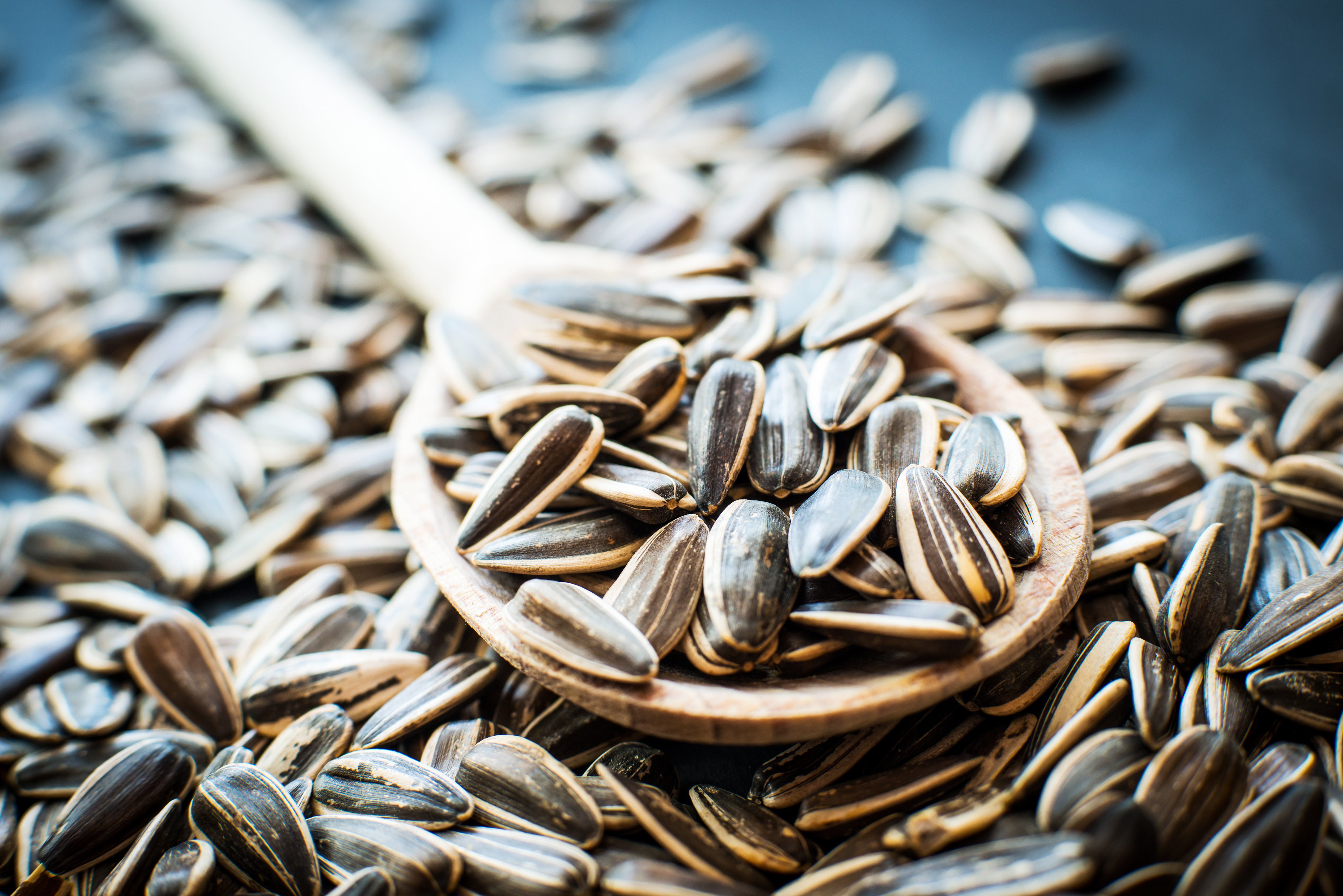
While some seeds need to have their shells or hulls removed before consumption, sunflower seeds are ready to eat once they’re removed from the sunflower that houses them. Most people prefer hulled sunflower seeds, though. They’re particularly high in healthy fats, containing both polyunsaturated and monounsaturated fats. Both of these fats are considered “good” fats and contribute to lowering the risk of heart disease, high cholesterol, and inflammation.
Sunflower seed nutrition
One serving of sunflower seeds without their hulls is four tablespoons (28 grams) and contains:
- Calories: 163
- Total carbohydrates: 6.7 grams
- Protein: 5.4 grams
- Total fats: 13.9 grams
- Fiber: 3.1 grams (11% RDI)
- Calcium: 19.6 milligrams (2% RDI)
- Iron: 1 milligram (8% RDI)
7. Pomegranate seeds
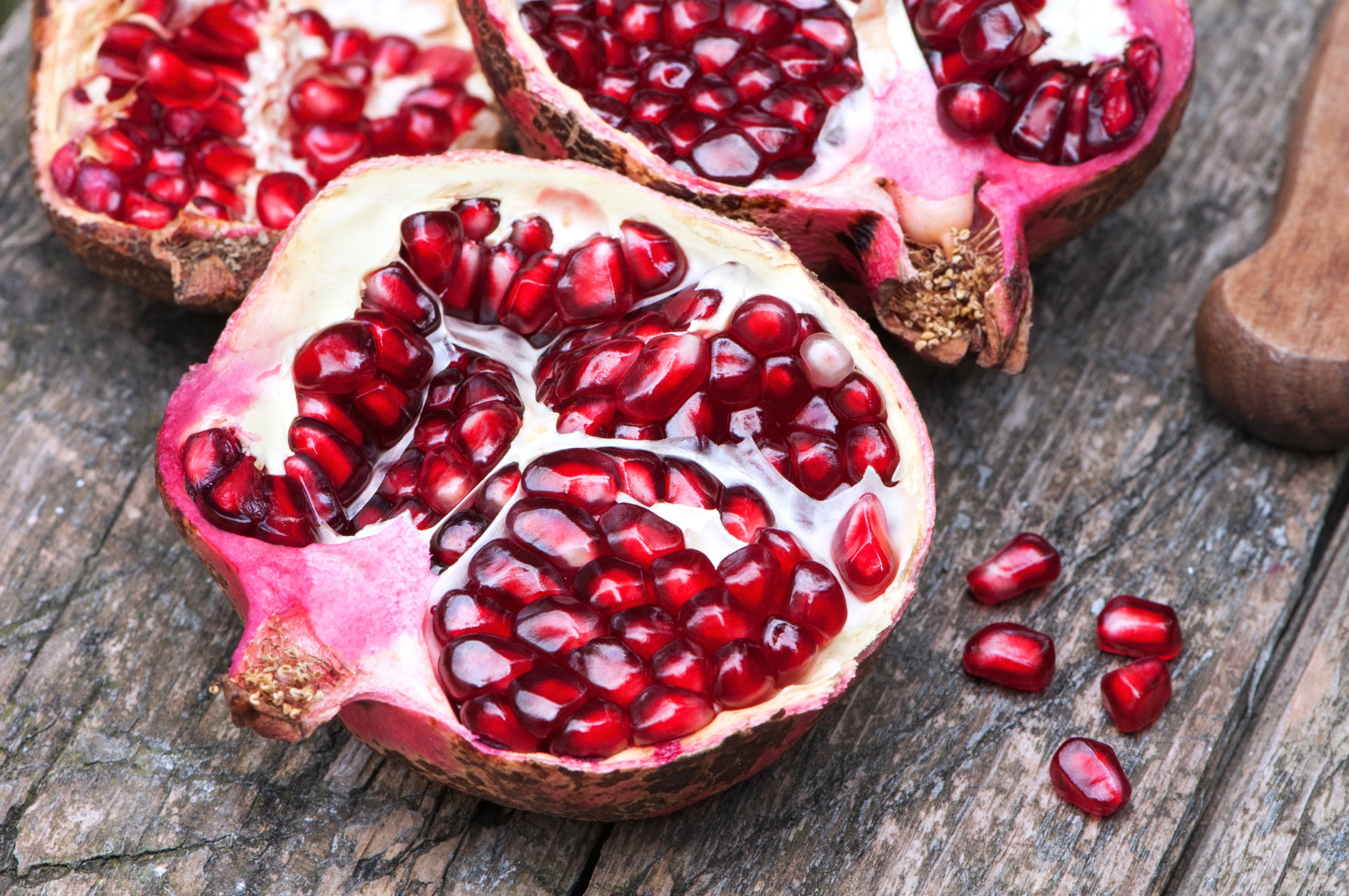
If you look closely, the shiny red jewels that pop out of pomegranates actually contain small white seeds. The red pods and seeds together are called arils and are a great source of many vitamins and minerals. Pomegranate seeds are very high in vitamin C, as one serving makes up 48% of the recommended daily intake.
Pomegranate seeds also contain many antioxidants, which help protect the body against inflammation and cancer-causing free radical damage. These antioxidants include tannins, anthocyanin, and flavonoids, which contributes to the vibrant ruby red that the pomegranate is known for.
Pomegranate seed nutrition
One serving of pomegranate seeds is a half cup (87 grams) and contains:
- Calories: 72
- Total carbohydrates: 26.3 grams
- Protein: 1.45 grams
- Total fats: 13.9 grams
- Fiber: 3.5 grams (12.5% RDI)
- Sugar: 11.9 grams (40% RDI)
- Potassium: 250 milligrams (5.3% RDI)
Risks of seed eating
Not everyone tolerates seeds in their diet well. Besides their propensity for getting stuck in teeth, seeds can get snagged along the digestive tract as well. For people who have inflammatory digestive diseases, like Crohn’s disease or ulcerative colitis, seeds may get stuck along an inflamed large or small colon, causing pain.
Diverticulosis occurs when small pouches (called diverticula) form within the large intestine. Food and waste can get stuck in these pouches, causing inflammation and infection, resulting in diverticulitis. Because of their small size and often indigestible hulls, it’s usually recommended that people with diverticulosis avoid eating seeds.
Incorporating seeds into your diet
Looking to add seeds into your diet? Try one of these seed-focused recipes:
Chia and Hemp Seed Pesto
From IIN grad Mikaela Reuben
Ingredients
- 1/2 tablespoon chia seeds
- 2 tablespoons water
- 2 cups packed basil
- 2/3 cup hemp hearts
- 1-1/4 teaspoon garlic, minced
- 1/2 teaspoon sea salt
- 2 tablespoons lemon juice
- 1 tablespoon nutritional yeast
- 1-1/2 teaspoon gluten-free tamari
Directions
- Soak chia seeds in water for 15 minutes prior to starting the pesto.
- Add all ingredients to a high-speed food processor. Blend on high, stopping to scrape down sides of container. Blend until creamy and well combined.
- Taste to adjust seasoning. Store in an airtight container in the refrigerator for up to 7 days.
- Toss with zucchini pasta, top on a pizza, or enjoy as a dip with crackers and veggies.
Pomegranate Avocado Dip
From IIN grad Drew Martino
Ingredients
- 2 cups pomegranate seeds
- 1/3 small or medium red onion, diced
- 1/3 cup chopped fresh cilantro
- 1 avocado, cut into small cubes
- Juice of one lime
- 1 teaspoon sea salt
Directions
- Mix all ingredients in small serving bowl. That’s it!
- Enjoy with romaine lettuce, cucumbers, peppers, or sweet-potato chips.
Pumpkin Seed Trail Mix Bites
From IIN's recipe blog
Ingredients
- 1 cup raw pumpkin seeds
- 1/3 cup dark chocolate chips
- 1-1/2 cups quick oats
- 1 cup natural peanut butter (creamy or chunky)
- 10 pitted dried dates
- 1/3 cup brown rice syrup
- 1/4 cup chia seeds
- 1 teaspoon ground cinnamon
- 2 tablespoons extra-virgin coconut oil, melted
Directions
- Pulse pumpkin seeds and chocolate chips in food processor until coarsely chopped. Pour into a bowl and add oats.
- Pulse peanut butter, dates, brown rice syrup, chia seeds, cinnamon, and coconut oil in food processor until they form a thick, creamy paste (scrape sides down as necessary).
- Add pumpkin seeds, chocolate chips, and oats and blend again until ingredients form a cohesive mixture that sticks to itself when pressed into a ball. If it seems too crumbly to scoop, add more coconut oil, one tablespoon at a time.
- Form approximately one tablespoon of mixture into a ball and place on foil or parchment-lined cookie sheet.
- Refrigerate bites until set, approximately one hour. Store in an airtight container in a refrigerator for up to two weeks, or freeze for up to two months, thawing slightly before consuming.
The bottom line
While seeds are a tasty and nutritious addition to most diets, people with inflammatory diseases – especially along the digestive tract – should avoid eating seeds when possible. For those who can have seeds, the seeds on this list help contribute to healthy heart, bone, brain, and digestive system health and taste great, too. Experiment by adding one or a few to your meals to find what works for you!
Published: June 8, 2024
Updated: November 6, 2024



